GhanaWeb feature by Frank Acheampong
The Japan National Stadium is not new, its towering frame, all warm timber lines and steel grace, have already seen the world gather once before.
But in 2021, when the Tokyo Olympics took place a year late, the stands were ghosted by an invisible enemy because of the restrictions of the Coronavirus pandemic.
The tracks still thundered, but the roars came from TV screens, not the grandstands.
Four years later, the ghosts are gone. From 13 to 21 September 2025, Tokyo’s air will be alive again, the same city that bowed politely to the world in silence will now sing.
Over 2,000 athletes from about 200 countries will step into the heat haze of late summer, chasing 147 medals across 49 events. The difference this time? You’ll hear every heartbeat.
What to Expect: A symphony in nine days
Nine days of competition is not just a schedule, it’s a story in chapters. The sprints, where victories are decided in blinks; the marathons, where every kilometre is a test of spirit; the field events, where stillness and explosion live seconds apart.
This is the 20th edition of the World Athletics Championships, the global summit where records fall, careers ignite, and legends sometimes end in heartbreak.
It is track and field’s ultimate meeting place, where the stars you know share a start line with names you’ll never forget after Tokyo.
Underdogs who might steal the light
Ghana’s Saminu and Azamati
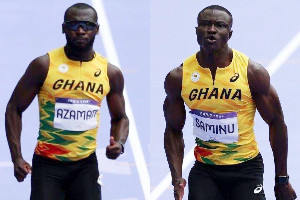
From Ghana’s quiet northern village to the world’s fastest lane, Abdul-Rasheed Saminu has become a sprint sensation.
From Ashaiman Market to Breaking Records: The resilient rise of Abdul Rasheed Saminu
In May 2025, he shattered his own national 100m record with a blazing 9.86s, only to demolish that again in July with 9.84s, now the third-fastest time in the world this year, second-fastest ever in NCAA history, and Ghana’s new sprint benchmark.
Watch how Rasheed Saminu finished second to Jamaica’s Kishane Thompson in 100m showdown
He already proved his mettle: semi-finalist in Paris 2024, and key part of Ghana’s gold-winning 4×100m relay at the 2024 African Championships.
A linguistic polyglot from Nanumba, Ghana, Saminu is no mere national hero; he’s a global standout.
Beside him, Benjamin Azamati remains a formidable presence. Azamati became the second Ghanaian in history to break the 10-second barrier in the 100m at the Tokyo Olympics (9.97 s). He remains part of Ghana’s sprint vanguard.
‘Records are meant to be broken’ – Azamati reacts as Saminu smashes his 100m record
Sorato Shimizu
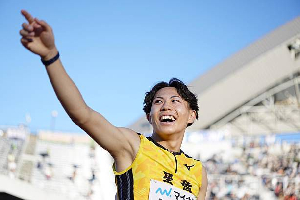
The locals will already know the name Sorato Shimizu, 16 years old, and already the fastest U-18 sprinter in history with a 10.00s 100m.
In the Tokyo night, with the home crowd chanting in waves, that 10.00 might not be enough to medal, but it might be enough to make a career.
From Australia comes Gout Gout, 17, a boy with a name you don’t forget and a stride you can’t unsee. His junior records make him dangerous.
The question is whether he can keep his nerve when the lanes beside him are filled with Olympic champions.
And there’s Ethan Strand of the US, the 1500m upstart with a 3:30s personal best, and Madison Wiltrout, making her global debut in the javelin.
They aren’t favourites, but Tokyo has always loved a surprise, from the streets of Shinjuku to the roar of the stadium.
Stars who want their shine back
Every championship has its redemption arcs. Zharnel Hughes, Britain’s sprinter with bronze in Budapest 2023, comes to Tokyo heavier with experience and sharper from recent wins.
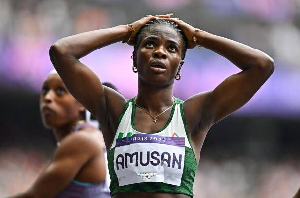
Tobi Amusan, Nigeria’s sprint-hurdle queen, exploded onto the world stage with a world record in Eugene, only to be sidelined by a careless doping whereabouts failure.
Cleared by the Court of Arbitration for Sport, she now arrives in Tokyo with redemption on her mind and the hurdles world title in her sights.
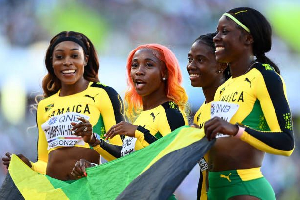
One of the most stunning upsets in Paris 2024 came from Jamaica, once a sprinting royalty. No Jamaican woman medaled in the 100m or 200m at Paris, the first time since 1988, and even the relay teams failed to perform.
It was a historic decline for a nation synonymous with sprinting excellence. Jamaica’s rebuilding starts now, with old guards like Elaine Thompson-Herah, Shericka Jackson recovering, new stars emerging, and Tokyo 2025 offering a stage to reclaim sprinting pride.
Giants waiting to continue their dominance
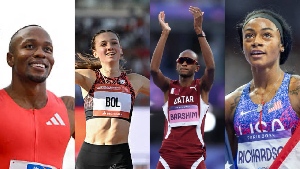
The World Championships are never short of towering names, athletes whose mere presence sends ripples through the stadium before the starting gun, the throw, or the jump.
In Tokyo, several such giants are primed to either extend their dominance or defend their thrones from hungry challengers.

Akani Simbine – Africa’s sprint sensation, still chasing that elusive global gold, and Tokyo might just be the stage where his experience tips the scales.
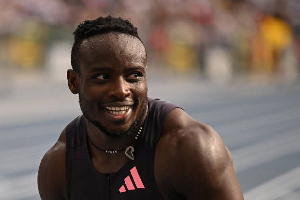
Ferdinand Omanyala – Africa’s fastest man and Commonwealth champion, bringing raw power and fearless starts that can upset the pecking order.
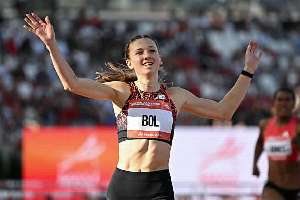
Femke Bol – The reigning queen of the 400m hurdles, blending elegance with raw power. After skipping parts of the 2025 indoor season to focus on recovery and relays, she returns to Tokyo sharper and hungrier than ever.
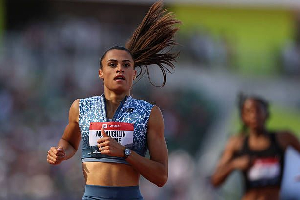
Sydney McLaughlin – Olympic and world record-holder in the 400m hurdles, known for precision and relentless drive. In Tokyo, she’s ready to test herself against Bol in a clash of titans.
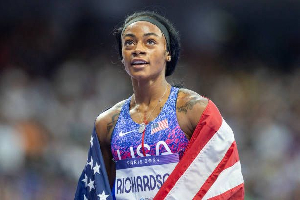
Sha’Carri Richardson – Defending 100m world champion, fast and fiery. A recent airport incident stirred headlines, but she arrives with a semifinal bye and a mission to let her sprinting do the talking.
Sha’Carri Richardson arrested for alleged assault on boyfriend at Seattle Airport
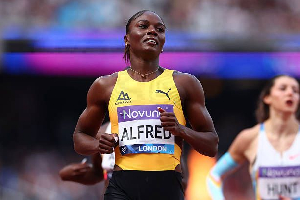
Julien Alfred – The reigning Olympic 100m queen from Saint Lucia, brings Caribbean pride and blistering pace to Tokyo.
Fresh off her historic Paris gold, and for a nation still celebrating its first Olympic medal, Alfred’s quest for more glory makes her one of the brightest stars waiting to shine.
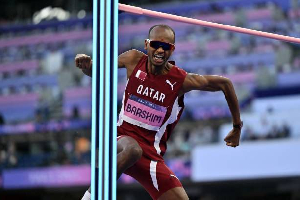
Mutaz Essa Barshim (Qatar – High Jump): Olympic co-gold medalist whose graceful, almost effortless leaps keep him in the conversation for every major title.
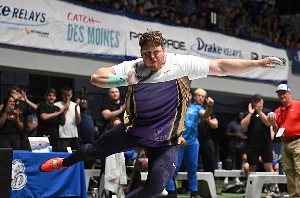
Ryan Crouser (USA – Shot Put): The big man with the big throws, world record holder and double Olympic champion.

Neeraj Chopra (India – Javelin): The reigning Olympic and World champion, carrying the hopes of a billion people with a golden arm.
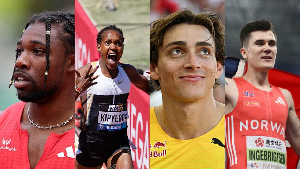
Then there are the titans: Noah Lyles, Faith Kipyegon, Mondo Duplantis, Jakob Ingebrigtsen, Yulimar Rojas.
They’ve known the view from the top, but in Tokyo, even kings and queens can be dethroned. In an arena this intense, glory has no guarantee.
Giants who could struggle
A championship in Tokyo is no easy feat. The humidity is a slow burn. The travel, the time zones, the sensory overload of a city that never stops moving, it all gnaws at the legs.
Some stars arrive tired, carrying seasons heavy with Diamond League battles.
Others face rising challengers who aren’t afraid of names, records, or reputations.
Even for the best, Tokyo might prove too much.
The story of these Championships might be as much about who falls as who flies.
Tokyo’s Pulse: Culture meets competition
Outside the Japan National Stadium, the streets will hum with the smell of grilled yakitori, the chatter of fans draped in flags, and the rhythmic clapping unique to Japanese sporting crowds.
The race walks will wind past the Meiji Shrine Outer Garden, a place where cedar-scented air meets the tick-tick-tick of racing feet.
This is the first major athletics event in Japan since the pandemic years, a chance for the nation to welcome the world without barriers.
For locals, it’s redemption. For visitors, it’s immersion: neon Shibuya crossings, calm temple gardens, and the hypnotic efficiency of the Shinkansen.
When it ends
When the final baton is passed, when the last javelin lands, the stories will scatter, to Accra, to Addis Ababa, to Kingston, to Brisbane, to small towns where the underdogs will return heroes.
The champions will wear their gold lightly or heavily, depending on how hard it was to win.
And Tokyo? Tokyo would have done what it could not in 2021: show the world, in person, that it is a city built to host the biggest stage in sport.
The stadium will sleep again, but the echo of nine days will last much longer.
FKA/EB
You can also watch the key highlights from the 2025 GFA Ordinary Congress


AloJapan.com